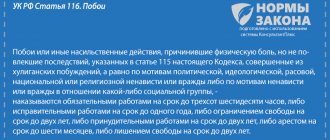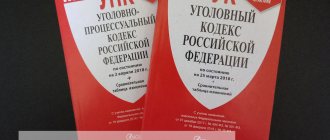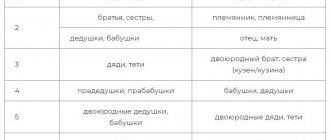There is an opinion that causing minor bodily harm is not prosecuted by law, and therefore it is impossible to hold people accountable, even administratively, for this. This statement is wrong.
The situation will be considered by the court as intentional infliction of minor bodily harm, and therefore, if the crime is proven, the culprit will be held liable in the form of a fine, correctional labor, or even a prison term.
Three main types of bodily injury
The criterion for the gradation of crimes and the amount of punishment is the consequences caused by the beating. The Criminal Code lists articles for intentionally causing damage in order of increasing severity of consequences with increased liability:
- Infliction of battery (Article 116 of the Criminal Code of the Russian Federation and 116.1 of the Criminal Code of the Russian Federation). On the same level as this type of act is Article 115 of the Criminal Code of the Russian Federation, which provides for liability for causing minor bodily injury;
- Moderate bodily injury. When considering criminal cases of this category, termination is possible due to reconciliation between the perpetrator and the victim. Otherwise, the punishment for such damage is in the form of imprisonment;
- Causing grievous bodily harm – Article 111 of the Criminal Code of the Russian Federation. It provides for maximum sentences in the form of imprisonment, in comparison with other crimes against health.
Other circumstances
Now we will discuss some of the nuances of this topic, which are covered by the Criminal Code of the Russian Federation. Bodily injuries that resulted from the commission of other crimes require special penalties.
In such circumstances, the law speaks of two typical cases - extortion and robbery . If we are talking about the first situation, here the violator faces a fine of up to 80,000 rubles or 4 years of imprisonment.
Causing bodily harm becomes an aggravating circumstance when committing robbery or extortion
However, inflicting a serious beating on the victim increases this punishment to 15 years of imprisonment and payment of a 1,000,000 fine . As for robberies, the legislation here allows for light beatings to the victims.
If the injuries are classified as severe or moderate, the crime is interpreted as robbery. Accordingly, damage to the health of other citizens increases the likely punishment for other crimes.
Punishment for beatings
Beatings are differentiated; liability for such actions is provided for in two articles:
- Article 116 of the Criminal Code of the Russian Federation - for beating those who are part of the circle of loved ones. These include parents, spouses, children, grandmothers, grandchildren, guardians and trustees, adopted children. Also among those involved will be those who started a fight for hooligan reasons, as well as for national reasons;
- Article 116.1 of the Criminal Code of the Russian Federation - for repeated beating. That is, if there is a previously assigned administrative punishment for such actions.
Liability for battery varies depending on specific circumstances. But a beating that does not result in consequences in the form of health problems (and does not fall under any of the listed criteria) does not entail criminal liability.
In the first case, the punishment ranges from 360 hours of compulsory work to 2 years of isolation .
In case of repeated beatings, the penalty is a fine of up to 40,000 rubles, or compulsory labor (up to 240 hours), as well as correctional labor ( up to 6 months ).
In the case of minor injuries, the punishment is similar in type, but somewhat harsher in size (up to 480 hours of compulsory labor , up to a year of correctional labor). If there is a proven hooligan or national motive (Part 2 of Article 115 of the Criminal Code of the Russian Federation), the punishment reaches 2 years in a penal colony.
Who is exempt from paying the assigned amount?
If sanctions are imposed on a juvenile offender, then his responsibility is delegated to the parents. For children who do not have parents, adoptive parents or guardians, the payment of the fine may be waived. In this case, the punishment is replaced - mainly with forced correctional labor.
Such action may be taken against other fined offenders if they are unemployed and do not have any income. In order to cancel the fine and replace it with correctional labor, you need to contact the district administration, where the decision was made to levy a proportionate amount of money. A statement is written to the chairman of the administrative commission that made the decision on the penalty, asking for a replacement of the punishment.
Payment of the assigned amount will need to be made before the end of the period specified in the administrative act. You can request a deferment of payment of funds for a period of 3 months by writing a statement to the chairman of the administrative commission requesting a deferment. A postponement is allowed at the discretion of the commission members.
You can appeal an administrative decision to impose penalties in a district court within 10 days after receiving the administrative act on the penalty. If the perpetrator has received a penalty in a criminal case, it is permissible to challenge the decision of the district court in the regional court. A period of 10 days is also allotted for this, after the issuance of an extract from the court decision, into the hands of the perpetrator.
The fine is paid:
- at a Sberbank branch;
- in the terminal;
- on the government services website.
If it is not paid on time, a penalty of up to 20% of the total amount accrued as collection is allowed.
IMPORTANT: In addition, the authorized authority has the right to demand a proportionate amount of an additional fine, in the amount of the current interest rate at the Bank of Russia exchange rate, for the illegal use of money.
If the culprit has not paid the assigned amount of money within three years, and the authorized authority has overlooked this violation, the debt claim loses legal force in accordance with the established statute of limitations.
Before the expiration of the three-year period, the property of the debtor upon payment of the fine may be seized and sold at auction. To do this, the administration submits a request for debt collection to the Bailiff Service.
Minor bodily injury
What is the difference between beatings and mild injuries?
Batterings do not always manifest themselves in the form of bruises, scratches, cuts, or hematomas. For liability for battery under Article 116 of the Criminal Code, it is sufficient to cause severe physical pain to the victim. Criminal liability for causing minor bodily harm involves deterioration in health for a period not exceeding 3 weeks. This is recorded by a forensic medical examination (see how to remove a beating).
How to prove that beatings were caused if there are no noticeable injuries on the body?
Other evidence must be provided, depending on the specific situation:
- this may be recordings from a surveillance camera (if the beating occurred in a public place);
- questioning of eyewitnesses;
- as well as those who provided assistance.
Under no circumstances refuse to undergo an examination if there are no bruises. Only a specialist can correctly record the consequences of a beating: if the physical manifestations of the beating are not visible, he will note in the document complaints of headaches, fatigue, dizziness, and pain in the internal organs. Such an examination will also serve as evidence of the accusation (see where to go to have the beatings removed).
If the skin is damaged, go to the emergency room. If you were given a referral by the police department, or undergo an examination at a paid examination bureau. A similar procedure for confirming harm to health is provided for light beatings.
What is the procedure
The statement of beatings must be sent to the magistrate’s court at the offender’s place of residence. The victim independently defends his accusatory position in court, in the absence of the prosecutor. The same rule applies in the presence of a mild health disorder.
The private nature of cases of beatings (as well as in the case of minor harm) provides not only for the obligation of the victim to independently secure charges, but also for the possibility of termination at any stage of the proceedings. A private prosecutor is given the right to withdraw a statement of battery from the police or court. In cases of public prosecution it is impossible to do so.
Previously, police officers were required to carry out a check on the received application, initiate a case and conduct an inquiry, and then send the materials to the court for consideration in the usual manner. Thus, if the beatings were caused as a result of hooliganism, then the “police” procedure for initiating a case was directly provided for by Art. 20 Code of Criminal Procedure of the Russian Federation.
Today this rule applies only under Art. 115 part 2 of the Criminal Code of the Russian Federation.
For example , if a person was beaten on the street by two strangers for hooligan reasons, then, regardless of health disorder or the presence of severe physical pain, the accusation against the criminal will be supported by a representative of the state.
In this case, a statement of the established form is written to the police.
Statement to the police
To the head of the police department _________(specify which) district of the city_________(specify which) Ivanova I.I., residing at the address: _______(specify) phone number _________________
Statement
I ask that two unknown persons be brought to criminal responsibility who, on January 1, 2021, in the Lenin Park in the city of _______________, at approximately 11:30 p.m., caused me bodily harm for no reason. One of them asked me for a cigarette, after a negative answer, he punched me in the face, immediately after that the second participant kicked me three times in the legs, after which I fell. Then the unknown persons kicked me several more times on the body, and then left. I report the following signs of the persons who beat me: ________________ (indicate which ones and what they were wearing, if you remember). As a result of the actions of unknown persons, I suffered the following bodily injuries: an abrasion of the lip, hematomas of both lower extremities, an abrasion of the right forearm. I undertake to undergo a medical examination. On criminal liability for knowingly false denunciation in accordance with Art. 306 of the Criminal Code of the Russian Federation warned.
Number ___________ signature ___________
How to bring the offender to criminal liability?
- The first thing to do is to attest to the bodily injuries that were inflicted . A medical examination can be carried out at the scene of the crime (and the opening of the case), but the victim may be redirected to another department.
- You can also take a referral for inspection in advance at the police station. But even this does not guarantee that the plaintiff will not be redirected to another place for a medical examination.
It is important to be prepared for this because the entire procedure of travel, queues and inspections can take more than one day. NOTE! The injury to health must be certified as quickly as possible, especially in cases where there are visible injuries (bruises, scratches, etc.). This is important for the victim himself. At trial, the degree of harm caused is taken into account. Half-healed wounds, diminished bruises or healed scratches will make less of an impression on the judge. - After the examination, the plaintiff needs to go to the police at the place where the crime was committed and write a statement, attaching documented inspection results. It is better to get a sample in advance - for example, you can download it on the Internet.
This is important because police officers have a lot of people handling these "minor" (compared to other) cases every day. Little time and attention will be given to the victim. If he comes without his sample, then they will simply dictate basic information to him, where something important may be missed. It also happens that the application is completed incorrectly, although it was written under dictation from the police. It's better to play it safe and do most of the work yourself.When describing what happened, pay maximum attention to every little detail that is relevant to the case. Remember that things like using something as a weapon or causing injury to the victim will increase your liability. This also includes an attack on the basis of ideological hostility or any other of those specified in Article 115.
If you have witnesses who can testify in court, this must also be reflected in the application . This detail will increase the chances that the criminal will be punished.
who has reached the age of 16 can be held accountable under this article . If the person who committed the crime is under 16, no punishment will follow. But in this case, it is possible to recover material damage from his parents, and the offender himself will be registered. Mentally incompetent citizens are also exempt from liability.
Moderate bodily injury
Battery of moderate severity is a serious crime and carries a penalty of imprisonment. To qualify the actions of the batterer, a forensic medical examination of the beatings inflicted is carried out. Her findings confirm the need for treatment of the victim for at least three weeks.
Depending on the situation in which the bodily harm was inflicted, the judge's sentence may be increased (see punishment for beating a person).
For example , if two friends were beaten at the same time. Both were in hospital for 24 days, then the perpetrator may be sentenced to imprisonment for up to 5 years (instead of 3 years, which are provided for in Article 112 of the Criminal Code of the Russian Federation for beating one victim).
The same punishment (up to 5 years) awaits someone who used moderate violence against a child under 14 years of age.
How to record and prove beatings
To bring the offender to justice, it is necessary to record the beatings in an emergency room or in a forensic medical examination institution (clause 6 of the Rules for determining the severity of harm caused to human health, approved by Decree of the Government of the Russian Federation of August 17, 2007 No. 522). According to clause 9 of the Appendix to the Order of the Ministry of Health and Social Development dated April 24, 2008 No. 194n, injuries that do not cause harm to human health (namely, they arise as a result of beatings) include injuries that do not entail a short-term health disorder or a slight permanent loss of general ability to work . These include, for example, abrasions, bruises, soft tissue bruises, and superficial wounds.
Since injuries caused by beatings can heal quickly, they should be fixed as quickly as possible. Removal of beatings is carried out in a short time after the victim contacts a medical institution. Based on the results of the examination by a doctor (expert), the victim is issued a certificate of beating. This document will help prove beatings without the presence of witnesses.
Serious bodily harm
Serious harm to health is also determined by a forensic medical expert. Such harm has serious consequences for the health of the victim. Sometimes irreversible and not treatable. According to the rules approved by the Decree of the Government of the Russian Federation, harm can be considered grave in the event of:
- inflicting life-threatening injuries on him;
- the onset of a mental disorder in the victim;
- his addiction to drugs.
For example , a criminal stabbed a woman in the face. There was no danger to the victim's life. But the deep cuts left scars. The actions of the attacker constitute a crime under Article 111 of the Criminal Code of the Russian Federation, since grave harm is expressed by the sign of “indelible disfigurement of the face.” The punishment that can be imposed on the perpetrator is imprisonment for a term of up to 12 years.
The most difficult cases are those where grievous bodily harm resulted in the death of the victim. In such cases, it is difficult to establish a cause-and-effect relationship between the actions of the batterer and the occurrence of death.
For example , after a man was severely beaten with a bat, his death was recorded. The cause was said to be bilateral pneumonia. At the same time, experts established that the bodily injuries of the deceased corresponded to grievous harm. It was they that led to the weakening of the body, the rapid development of pneumonia and death. The offender inflicted the beatings intentionally, but did not think about the consequences in the form of weakening of the body and death. The perpetrator will be charged with intentionally causing grievous bodily harm resulting in death through negligence. According to the court verdict, punishment is possible for up to 15 years.
Question:
What kind of article will the person who beat me have if I was in treatment for exactly three weeks?
In your case, the crime of the perpetrator will be qualified under Part 1 of Article 115 of the Criminal Code of the Russian Federation, since his actions caused a short-term disorder in your health. According to the Rules for Determining the Severity of Health Harm, a disorder that requires treatment for 21 days inclusive is considered short-term.
Question:
How will the coach who beat my child be punished?
Criminal liability of a coach for beatings will occur only if there is a health disorder, that is, under Art. 115 of the Criminal Code of the Russian Federation. If a child suffers physical pain without consequences, liability under Art. 116 of the Criminal Code of the Russian Federation will be avoided by the coach (taking into account changes dated July 14, 2016 in the Criminal Code of the Russian Federation). At the same time, as an official who, due to his professional duties, was entrusted with a child, the coach can be held accountable for cruelty to minors (Article 156 of the Criminal Code of the Russian Federation). Moreover, in addition to punishment in the form of imprisonment, he may be deprived of the right to work in a children's institution for a period of up to three years.
Question:
What will happen - murder or infliction of grievous bodily harm resulting in death, if after being stabbed in the chest the victim died a week later?
If the blow was struck with a knife directly to the heart area, the actions of the perpetrator contain signs of murder, and it does not matter when the victim died - on the same day or after a while. Based on judicial practice, it is usually believed that when delivering such a blow to a vital organ, the accused could not help but know that the consequences could be death. Consequently, negligence in relation to the consequences is excluded, intent is confirmed.
Question:
What does “national motive” mean when beating?
State policy has long been promoting counteraction to manifestations of extremism. Nationally motivated beating means infliction of bodily harm due to hatred of a certain group of people belonging to a particular nationality. Such a motive is currently directly provided for in the disposition of Article 116 of the Criminal Code of the Russian Federation and is one of the mandatory signs of the act. Also, a national motive may be provided in the form of an additional qualifying feature (for example, Part 2 of Article 115 of the Criminal Code of the Russian Federation) or be an aggravating circumstance when assigning punishment.
- Criminal Code of the Russian Federation Article 111. Intentional infliction of grievous bodily harm
- Criminal Code of the Russian Federation Article 112. Intentional infliction of moderate harm to health
- Criminal Code of the Russian Federation Article 115. Intentional infliction of minor harm to health
Corpus delicti
The corpus delicti under Article 116 of the Criminal Code of the Russian Federation arises when the following conditions are simultaneously met:
- the victim suffered physical pain;
- there were no consequences in the form of causing minor harm to the victim’s health;
- the beating was committed out of hooligan motives or based on political, ideological, racial, national or religious hatred or enmity.
Thus, as a result of beatings, minimal damage is caused to a person’s health compared to other crimes involving intentional harm to a person’s health. In addition, an important qualifying feature of beatings is the motive of the person who inflicted the beatings on the victim. Explanations on the essence of the motives are given in the Resolution of the Plenum of the Supreme Court of the Russian Federation dated November 15, 2007 No. 45. According to paragraph 12 of the Resolution, criminal acts committed out of hooligan motives are understood as intentional actions that were committed without reason or with little reason. To correctly qualify motives, it is necessary to establish who initiated them, whether the victim was the instigator of the quarrel, and whether the victim’s unlawful behavior served as a reason for the conflict.
What is beating according to the legislation of the Russian Federation?
Battery is defined as multiple blows or other actions using physical force that cause physical pain to the victim and may result in bodily harm. It is the nature of the harm that will be recorded as a result of striking that will have legal significance for punishing the offender.
We can highlight the following nuances of beatings as an unlawful use of physical force:
- Punishment for beatings can only be applied if the offender’s actions are intentional, i.e. this subject is initially aware of the illegality of his behavior (causing harm through negligence will entail criminal prosecution only in case of serious harm to health or death);
- beatings can be inflicted both with parts of the body (hands, legs) and with the use of various objects. If additional items are used, the punishment may be much more severe, even if such actions did not lead to serious consequences;
- The law provides for the following gradation of consequences from beatings - light, moderate or severe harm to health, as well as death.
The punishment for assault will depend on the severity of the health consequences. The objective nature of the harm can only be established based on the results of a medical examination, which the victim undergoes according to the prescribed examination. The expert's conclusions will be the basis for qualifying the offender's actions - administrative or criminal liability, the choice of a specific article of the Criminal Code of the Russian Federation or the Code of Administrative Offenses of the Russian Federation.
Let's consider what kind of beatings can be according to the norms of the Criminal Code of the Russian Federation and the Code of Administrative Offenses of the Russian Federation, what factors will affect the nature of the offender's responsibility.
How to apply
Battery is a crime of minor gravity, the statute of limitations for it is two years (Article 78 of the Criminal Code of the Russian Federation). To bring the culprit to justice, you must file a police report.
reports of assault to the police
Based on the application, a pre-investigation check is carried out, the time frame for considering a statement to the police about beatings is up to 10 days, in special cases it can be extended up to 30 days. Based on the results of the inspection, one of several decisions can be made:
- refuse to bring the perpetrator to justice;
- bring the culprit to administrative responsibility under Art. 6.1.1. Code of Administrative Offenses of the Russian Federation;
- bring the perpetrator to criminal liability under Art. 116 or 116.1 of the Criminal Code of the Russian Federation.
If the victim agrees with the culprit on compensation for the damage suffered, he can withdraw the statement from the police about the beatings and resolve the conflict. Otherwise, the culprit will be held accountable by law.
Marina Aksenova Lawyer, website author
Expert commentary






